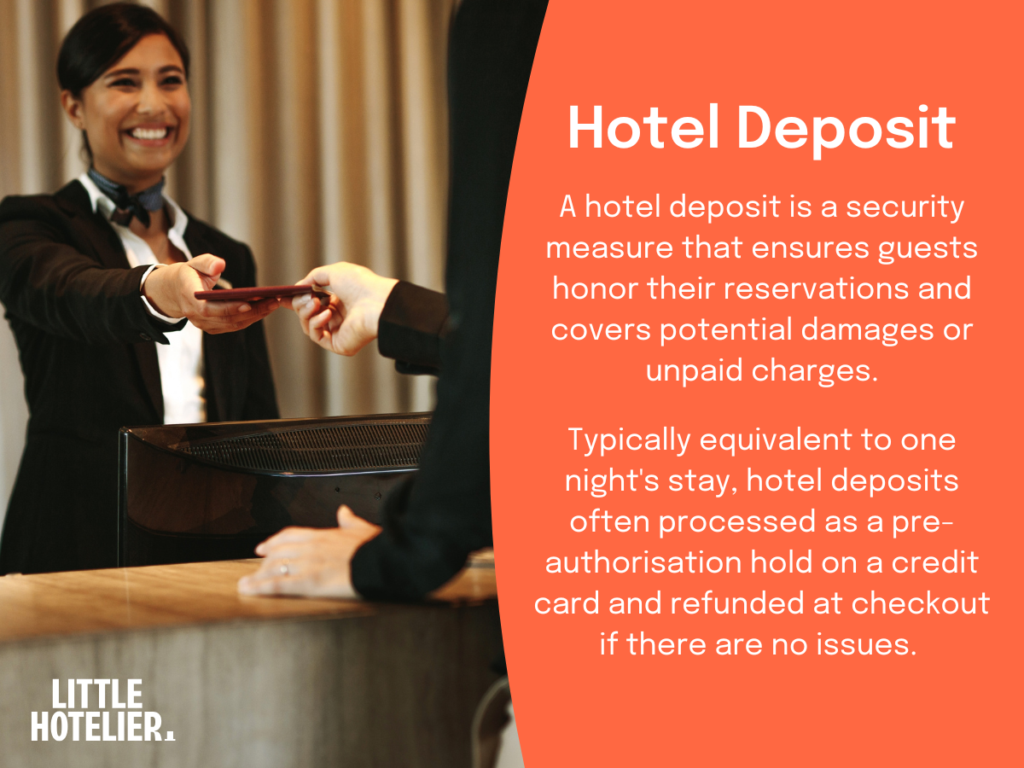What is a hotel deposit?
A hotel deposit is a payment made by guests to secure their reservation and to cover potential excess costs during their stay, from damages to incidentals.
A hotel room deposit can take the form of either a credit card pre-authorisation or a payment that is refunded on check out.
In this guide we’ll take a deeper dive into this hotel deposit meaning, revealing all that a property owner needs to know about hotel cash deposits and pre-authorisations.
Simplify your deposit process with Little Hotelier
Little Hotelier centralises your payment processing in one powerful platform, giving you the ability to process deposits, pre-authorisations, and refunds whether you're at the front desk or on-the-go.
Learn moreWhy do hotels charge a deposit?
Why do hotels ask for a deposit from guests? A hotel might charge a deposit to guard against no shows, as this encourages guests to follow through with their booking. And by charging security deposits – aka damage deposits – hotels can compel their guests to treat properties with respect, lest they lose that downpayment. If damage does occur, the deposit can go some way to paying for it.
Do all hotels require a deposit?
Do hotels charge a security deposit as a rule? No, not all hotels require a deposit, but most, including the majority of the world’s larger chains, do.
Hotels that don’t charge a deposit are typically smaller, independently run operations, such as boutique hotels, B&Bs and hostels.
This poses a question: is a deposit negative or positive? For the most part, both hotels and guests acknowledge that deposits are often necessary, and understand why the policy exists.
Hotels with no deposit
So which are the hotels that don’t require deposits? A few hotels without deposit policies – at the time of writing – include:
- Hilton: Most Hilton hotels do not charge deposits on direct reservations. If you cancel before the deadline (usually 1-3 days before check in) you get your money back, and after that, you’re charged for the first night if you don’t show.
- Motel 6: The majority of Motel 6 bookings do not require a deposit, although they do require “an advance payment deposit of the total charges for the first night’s lodging.”
- Extended Stay America Select Suites: A longer-term accommodation option, this arm of the Extended Stay chain requires no security deposit (and no binding lease).

What are the different types of hotel deposit fees?
A few different terms are used to describe hotel deposit fees, and there can be slight differences in the definitions of each. Damage deposits and incidental deposits are both forms of hotel security deposits. Advance deposits are charged ahead of time, while credit card holds aren’t technically charged at all.
- The two most common types of deposit are ‘advance’ (partly or fully repaid prior to arrival) and credit card holds/pre-authorisations (where funds are reserved but not charged on a guest’s credit card).
- Hotels that require no deposit or guarantee experience significantly more cancellations and no-shows than those with prepayment or deposit requirements.
- Deposit fees can also be used to support “Buy Now, Pay Later” offerings and new ‘scheduled pre-payment’ solutions, allowing hoteliers to split guest payments across multiple dates pre-arrival.
While the specific rules of hotel deposits can vary, most work in more or less the same way. The main difference is in the wording used, as a few different terms are used to describe hotel deposits. Here are the most common and what they mean.
Pre-authorisation
A pre-authorisation is a temporary hold of funds placed on a guest’s credit or debit card rather than an actual transaction: the money isn’t taken, it’s just set aside. It ensures there are sufficient funds to cover potential costs, such as room service or damages, while giving the guest the confidence that the money hasn’t actually left their account (at least until any final charges are processed at check-out).
Deposit payment methods
As a hotelier you’ll typically accept deposits by credit/debit card, bank transfer, perhaps even cash (though this method is becoming obsolete). Digital payment links are increasingly popular for securing bookings, as they can easily be included as part of the direct booking process on your site. Cards typically offer the most security for the hotel, but it is important to extend the protection to guests too: ensure their data is secure by using a payment processor that is PCI DSS-compliant.
Deduction/partial deduction
This occurs when a hotelier keeps a portion of the initial deposit to cover specific costs incurred during a stay, like a mini-bar bill or late cancellation fee. If the guest has looked after the property and settled their bill, any remaining funds from the hold or deposit must be released back to them at your earliest convenience to keep guests happy and maintain trust. If guests are constantly chasing you for their deposit, it wastes both of your time, and can seriously damage your hotel’s reputation.
Hotel security deposit
A payment made by guests at check-in to cover potential damages or unpaid charges during their stay.
Incidental hotel deposit
A payment or pre-authorisation to cover any extra expenses like room service, mini-bar usage and in-room purchases.
Hotel incidental charges
While the terms ‘incidental hotel deposit’ and ‘incidental hotel charges’ are often used interchangeably, particularly by guests, hoteliers need to distinguish between the two and record them accurately in the books. The incidental deposit is the ‘safety net’ – the total sum you hold at the start of the stay – while incidental charges are the actual line items for services used: parking, laundry, massages, a bottle of wine from the bar. At the end of the stay, these specific charges are tallied up and either deducted from the initial deposit or billed as a final balance at check-out.
Hotel damage deposit
What is a breakage deposit at a hotel? Another name for a security or damage deposit, it’s a charge taken at check-in to cover possible damage to the room or hotel property, and is refunded at check-out if no damage is found.
Advance hotel deposit
A partial or full payment made by guests at the time of booking to secure their reservation.
Early check-in or late check-out deposit
A fee charged to guests requesting check-in before the standard time or check-out after the standard time.
It’s important to note that deposit rules can vary based on payment type: credit cards, for example, allow simple holds, while debit cards typically require an upfront transaction that takes longer to refund. Providing these options offers payment flexibility to your guests, but you need to clearly communicate the rules and systems around each type. A physical cash deposit, for example, might be held in a safe until the room is inspected at departure.
How do hotel deposits work?
A hotel deposit is usually taken at check-in, but sometimes beforehand. The deposit can usually either be paid in cash or on card, or can be held as a ‘pre-authorisation’ on a credit card, where money is held but not actually taken.
What is the standard hotel check-in procedure?
Maintaining a consistent check-in process ensures that both the guest experience and your hotel finances are protected. The standard procedure typically involves the following steps:
- Guest identification: Start by verifying the guest’s identity against their booking details using a valid form of ID, such as a passport or driver’s licence.
- Registration: The guest completes a registration form with key info like their contact details and potentially vehicle registration if they’re using your car park.
- Deposit/pre-authorisation: Process the deposit/credit card hold. Explain what the funds cover and when they will be released.
- Outline policies: Briefly outline essential house rules on things like breakfast times, late check-outs and your policy on damages.
- Key handover: Payment secured and guest informed, hand over the room keys and help the guest to their room.
How much is a hotel deposit?
A hotel deposit typically costs within the range of $50-$200.
Do hotel deposits get refunded?
Yes, guests can get a hotel deposit refund if no damage is made at the hotel or no incidentals need to be charged. You should be fully refunded or the credit card hold should be released at check out.
How long does a hotel deposit refund take?
How long do hotels take to refund deposits? Or from the guest’s point of view, how long does it take to get a hotel deposit back on a credit card? Depending on the guest’s bank or credit card provider, most refunds will typically be processed within 3-10 business days.
What guarantees do hotel deposits cover?
In the hospitality industry, the term ‘guarantee’ is often used to describe whatever security the guest provides to confirm they will honour their booking. The guarantee is the underlying promise that the room will be held exclusively for that guest, while the deposit serves as the financial mechanism that backs up this guarantee. If a guest fails to arrive or leaves without settling their bill, you have a pre-secured method to recover lost revenue.
Hold period
While the average is 3-10 business days, the precise length of the timeframe known as the ‘hold period’ is largely determined by the guest’s bank, not the hotel. Once you trigger the release of a pre-authorisation, usually at check-out, your system sends a notification to the bank to drop the hold. But because banks process these requests in batches and must verify the transaction, it can take over a week for the ‘pending’ status to disappear from the guest’s statement and for the funds to be fully restored.
Key takeaways
- Hotel deposits are usually taken at check-in and may be held on a credit card, but not charged.
- Refunds are issued if there’s no damage or additional charges incurred during the stay.
- Deposit refunds typically take 3-10 business days to process, though this timeframe is controlled by the guest’s bank or credit card provider.
How do you create a hotel deposit policy?
If you’re creating a hotel deposit policy from scratch, it’s wise to align your policy with guest expectations wherever possible:
- Clear and fair deposit policies can save you and your guests time at check‑in, and help you to build guest trust through transparency. If your system is unusual, you need to let guests know.
- Most hotels will place a credit card hold between $100 and $200 at check‑in to cover incidentals or damages, releasing that hold a few days after check out.
- Another common policy is for the deposit to be refunded if a guest cancels their reservation more than 72 hours before arrival, but not after that date.
To create your hotel deposit policy, clearly define when and how deposits are collected, whether as a fixed amount or a percentage of the booking, and outline acceptable payment methods of credit card hold, cash, or electronic payment. Specify refund conditions, including the timelines and circumstances where deposits may be withheld. Ensure the policy is easy to understand and transparently communicated at booking and check-in.
Let’s walk through a hotel deposit policy example process to gain a slightly deeper understanding of how you might go about creating yours.
Set an amount that protects without deterring bookings
Begin by evaluating the right amount for your property and guest type. Try to work within that $50-$200 range that guests have come to expect. Consider using dynamic or tiered deposits, which allow you to adjust the value of the deposit for each booking. A higher deposit might be necessary for high-risk bookings from third-party sites, while loyal direct bookers might deserve a lower deposit. By lowering your deposit requirements during low season or for mid-week stays, you can minimise the barrier to entry and attract more bookings when demand is quieter.
Offer flexible deposit alternatives for guests
Consider alternatives to traditional deposits, such as damage waivers, incidental fees and insurance. Think carefully about whether your guests would prefer these alternatives, and how you might communicate their pros and cons. Sometimes a simple, standard security deposit is the best option.
Provide various payment methods for deposits
By offering flexible deposit and payment options that make reservations easier for your ideal guests, you can drive more bookings and maximise your occupancy.
Communicate your hotel deposit policy clearly
Confirm your deposit policy through pre-arrival and confirmation messages, and signage at your check-in desk, to minimise guest confusion and potential annoyance.
Handle hotel deposit refunds effectively
Ensure your staff have a deep understanding of your deposit policy, including the deposit ledger, how to efficiently process deposits and refunds, instances where the hotel security deposit is not refunded, and the typical refund times a guest can expect.
Effective refund management also demands a strategy for handling disputes, which can arise when a guest contests a charge, such as for damages or a late checkout. If a guest initiates a ‘chargeback’ through their credit card company, the bank will typically pull the funds back from your account while they investigate. To win these disputes, you must provide clear evidence – a signed registration card, photos of the damage, a timestamped folio of incidental charges – to prove the charge was valid and in line with your terms and conditions.
Automate deposit processes to simplify your operations
By automating your deposit processes in a powerful, all-in-one PMS, you give your front desk staff better control while reducing opportunities for human error.
Key takeaways
- Align deposit amounts with industry standards ($50-200) to meet guest expectations while protecting your property.
- Clear communication at booking and check-in prevents confusion and builds trust with guests.
- Automation reduces administrative burden and human error while improving the guest experience.
Frequently asked questions about hotel deposits
How do I manage deposit collection when guests book through different channels?
While you set your own deposit policy, collecting deposits can work differently depending on whether guests book direct, through OTAs, or by phone. Some properties collect deposits at booking, others at check-in. Using a centralized payment system helps you apply your policy consistently regardless of how the guest books, reducing confusion for both staff and guests.
Should I charge different deposit amounts for different room types?
Many properties charge higher deposits for suites or rooms with expensive amenities, and lower deposits for standard rooms. You might also consider the length of stay. A two-week booking carries more risk than an overnight stay. The key is keeping your policy simple enough for staff to explain and guests to understand.
What’s the best way to communicate deposit policies to avoid surprises at check-in?
Clear communication prevents complaints and negative reviews. Include your deposit policy in booking confirmations, pre-arrival emails, and on your website’s FAQ page. Many properties also display a simple sign at check-in explaining the deposit amount and refund timeline. When guests know what to expect, check-in goes more smoothly.
When can a hotel keep your deposit?
Hotels may retain part or all of your deposit to cover damages to the room or property, unpaid incidental charges such as mini-bar or room service, late checkout fees not settled at departure, or cancellation penalties if you cancel within the restricted period. Any deductions should be itemised and communicated to you at checkout.
By Dean Elphick
Dean is the Senior Content Marketing Specialist of Little Hotelier, the all-in-one software solution purpose-built to make the lives of small accommodation providers easier. Dean has made writing and creating content his passion for the entirety of his professional life, which includes more than six years at Little Hotelier. Through content, Dean aims to provide education, inspiration, assistance, and, ultimately, value for small accommodation businesses looking to improve the way they run their operations (and live their life).
Table of contents
“The mobile app is a breeze to use and when you need assistance, you can always count on excellent customer service to be there for you.”
Managing Director, Smans Villas









Elaine Milne,
Owner
Calder House